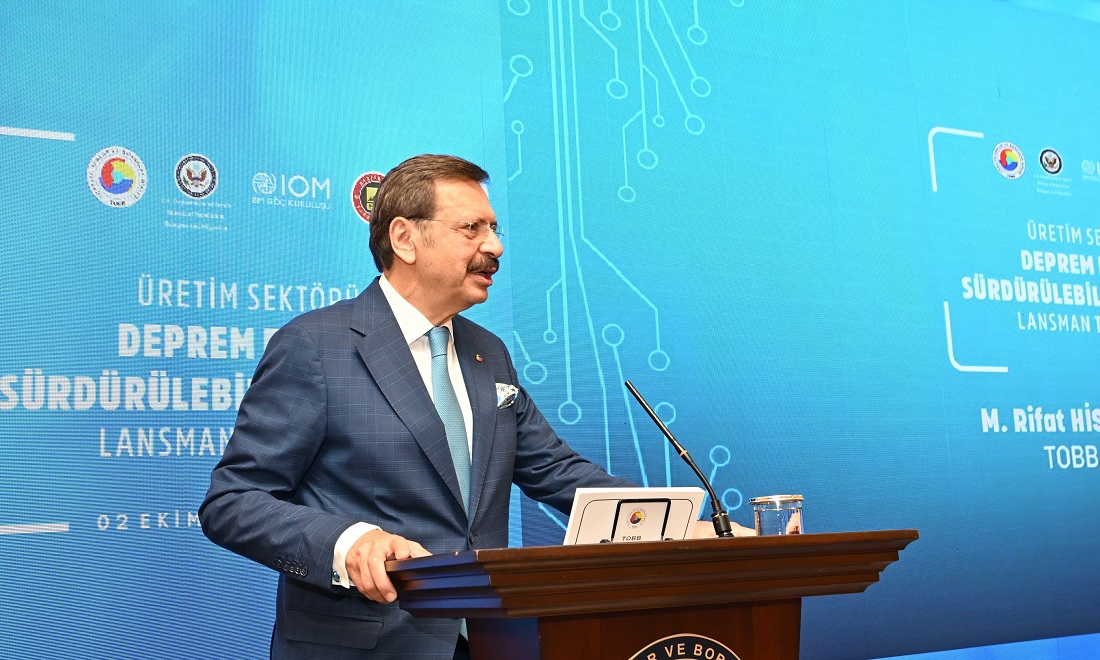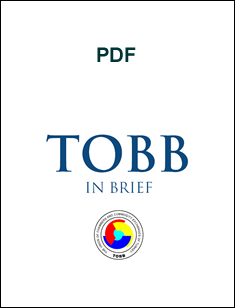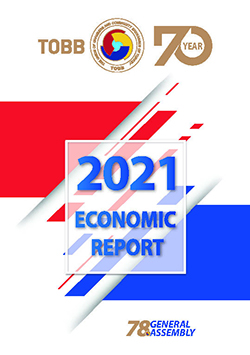Industrial road map for the earthquake zone announced at TOBB

02.10.2023 / Ankara
After the earthquake disaster in 11 provinces, the “Earthquake Impact Analysis and Reporting Study of the Manufacturing Sector” prepared by Gaziantep Chamber of Industry (GSO) and the United Nations International Organization for Migration (IOM), which includes the short, medium and long term road map of the manufacturing industry in the region, was introduced at a meeting hosted by the Union of Chambers and Commodity Exchanges of Türkiye (TOBB).
In his speech at the opening of the meeting, TOBB President M. Rifat Hisarcıklıoğlu noted that we experienced a terrible earthquake disaster on February 6 and said, “As in every national issue, we quickly took action as the Chamber and Commodity Exchange Community in this process. We sent 36,000 tons of food, 3,900 containers, 6,000 tents, more than 100,000 heaters, 817,000 blankets and 530 tons of fuel oil, 551 construction machines and mobile cranes. We established food kitchens at 24 points and distributed hot meals to 3.5 million people. In the next stage, we organized a campaign to meet the need for permanent housing in the region. We transferred all the financial resources we had to this work.”
Explaining that they have prepared various initiatives to revitalize the economy and employment in the region, Hisarcıklıoğlu said, “With the My Supplier from the Earthquake Region Program, we matched companies that want to buy goods from the earthquake region with producers in the earthquake region. We directed National Food Retailers to supply from the earthquake region. In the earthquake region, we ensured that the agricultural and food products remaining in the hand, warehouse and field were purchased by national market chains. We ensured that the Trade Marketplaces support the producers in the Earthquake Region. We enabled the sellers in the earthquake region to sell without commission in e-commerce marketplaces.”
Stating that the aid provided by the state and the nation is important, necessary and valuable, Hisarcıklıoğlu emphasized that on the other hand, it is necessary to ensure that the people in the earthquake zone stand on their own feet by producing and trading.
Stating that the latest figures on employment show a striking decrease in the number of employees in the region, especially in 4 provinces, TOBB President continued as follows: “Hatay was the province where the earthquake had the most negative impact on employment. The number of private sector employees in Hatay decreased by 35 percent. In other words, one out of every 3 people is no longer working. Registered employment, which was 165,000 last year, dropped to 107,000 this year. This means that 58,000 people quit or lost their jobs. The number of employees in the private sector in Kahramanmaraş decreased by 29 percent. The number of employees dropped from 147,000 to 104,000. In Malatya, it decreased from 95,000 to 71,000. In other words, one out of every 4 people who used to work is no longer employed. Private sector employment in Adıyaman also decreased from 55,000 to 48,000.”
Hisarcıklıoğlu stated that the way to revive cities is to revitalize the economy and said, “Gaziantep and our Chamber of Industry have taken action and started to work with this vision. In addition to our public and private sector institutions, it has implemented a very important work with the support and contributions of international organizations.
The report, which will be presented today, is of great value as a road map for our industry in the earthquake zone and is of reference quality. It lists what needs to be done in the short, medium and long term, outlines concrete policy steps for local and regional development, and sets out constructive recommendations for our institutions on what steps should be taken.
I congratulate and heartily congratulate our regional Chambers and Commodity Exchanges, Ministries, Governors, Mayors, United Nations team, TSE, KOSGEB, TÜBİTAK and Development Agencies, especially Gaziantep Chamber of Industry, who have made great efforts in this comprehensive work.”
Pointing out that Gaziantep is one of the most important industrial production centers not only in the region but also in Türkiye, Hisarcıklıoğlu said, “It is a city with a branded name. Last week, Türkiye's Top 500 Industrial Enterprises were announced by the Istanbul Chamber of Industry. 28 companies from Gaziantep were among the first 500 companies. I would like to thank all our companies that make Gaziantep proud with their success in production, export and employment despite all the difficulties they face and wish them continued success.
Gaziantep has become a leading city not only in the field of industry but also in the field of gastronomy and has been awarded the title of UNESCO City of Gastronomy. It has also become a pioneer, example and role model in geomarked products. The registration of the geographical indication of Antep Baklava, the first EU registered product of our country, was realized by our Gaziantep Chamber of Industry. As a result of our Chambers and Commodity Exchange's ownership of this work, Gaziantep has ranked first in Türkiye in this field with 102 geomarker registered products. This figure is more than the total number of registered products in many European countries today.
Finally, I would like to end my speech by saying this: Let's not be discouraged. Let us trust ourselves and our country. We have overcome many adversities in the past. Hopefully, we will leave this behind by being united and together.”
- “Production, exports and employment must continue”
GSO President Adnan Ünverdi said, “Our wound is very fresh and despite all our pain, we have to somehow heal our wounds psychologically and socially and recover by repairing the damage to our economy.”
Reminding that the total exports of the 11 provinces affected by the earthquake last year amounted to 20.510 billion dollars, Ünverdi said, “A total of 47,581 companies are manufacturing in these provinces. According to 2021, the total number of employment in our 11 provinces is 3 million 841,000 people. The share of the earthquake zone in total employment is 13.3 percent. Despite such a large business volume, there was migration to other provinces with the effect of the earthquake, fear and anxiety, and serious job losses were experienced.”
Ünverdi said that in order to get back on its feet, production, exports and employment must continue, and that both the public and private sectors are making an extraordinary effort in this direction.
Stating that they have determined that there is a need for a road map in order to carry out the process effectively in terms of both production and employment, to prevent loss of time, to analyze correctly and to reach the result quickly, Ünverdi said that in this direction, “earthquake impact analysis and reporting study of the production sector” was carried out by Gaziantep Chamber of Industry and IOM.
Adnan Ünverdi noted the following: “With the report, for 5 of the 11 provinces affected by the earthquake (Gaziantep, Kahramanmaraş, Malatya, Adıyaman, Antakya provinces), it is aimed to reveal the situation of enterprises operating in the production sector and their employees affected by the earthquakes and to create short-medium and long-term action plans for the industrial structuring and improvement processes of the region together with these provinces.
In the study, a questionnaire for the owners or officials of the producer companies, a questionnaire for the employees of these companies, qualitative interviews were conducted with the chambers affiliated to the Union of Chambers and Commodity Exchanges of Türkiye, of which the producer companies are members, and relevant institutions and organizations.”
Ünverdi said that as a result of this effort, time and work, 5 provincial reports were prepared, including green transformation, digitalization, lean production and efficiency elements, short, medium and long term action plans and project proposals, and a regional report covering all provinces, again including short, medium and long term action plans and project proposals.
- “The earthquake had a big impact on the production sector”
IOM Türkiye Mission Chief Gerard Karl Waite reminded that 8 months have passed since the devastating earthquakes and said that the earthquake had a great impact on the production sector.
Pointing out the importance of seeing the whole picture in order to create the targeted recovery support in reconstruction after the earthquake, Waite said:
“The report takes a close look at how the manufacturing sector was affected in the 5 provinces most affected by the earthquake. It includes information on the economic aftermath, vulnerabilities within the supply chain and the impact on the workforce. It highlights the importance of resilience infrastructure and outlines the opportunities for innovation as businesses adopt new technologies. This report provides short-, medium- and long-term recommendations on how to sustainably revitalize the manufacturing sector.”
- “We draw on the power of our state and humanity”
Gaziantep Governor Kemal Çeber also stated that the earthquake caused great destruction and said, “It was a very difficult and difficult event to overcome, but I leave it to everyone's appreciation where we have come from in the past 7-8 months. Our strength and power as a country is very important. We also saw humanity in that region and showed solidarity. We are currently experiencing a process in which nearly 20,000 demolitions continue in Gaziantep alone, there are no tent cities left in, every citizen received container homes, and every need is met. We are using the power of our state and humanity.”
Following the speeches, Assoc. Prof. Dr. Esin Sarıoğlu and Dr. Fatih Balcı presented the project result reports.
Your message has been sent
Thank you |




